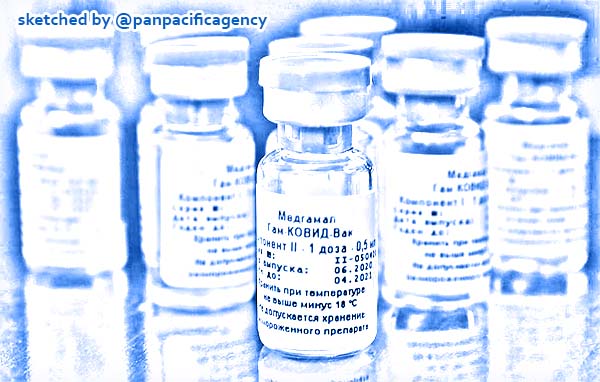Russia offers to share Sputnik V vaccine production know-how with Malaysia

Russian coronavirus vaccine. © Mikhail Djaparidze/TASS. Sketched by the Pan Pacific Agency.
KUALA LUMPUR, Mar 10, 2021, Malay Mail. Russia has offered to share its skills and technical know-how with Malaysia to help the country become a vaccine producer and reduce dependency on other countries, its ambassador to Malaysia Naiyl M. Latypov told Malay Mail.
Malaysia has already ordered more than six million doses of Russia’s Sputnik V vaccine as part of the cache of Covid-19 vaccines procured to inoculate up to 80 per cent of the population by year’s end.
Russia may be on the cusp of a geopolitical shake-up that could put the nation on par with other major technological powers thanks to its Sputnik V vaccine.
Kremlin officials said up to 50 countries are already on the verge or have approved the use of Sputnik V on their population, having received over two billion orders for the vaccine by the end of February.
Russian Ambassador Latypov said his country has offered to collaborate in capacity building, technology sharing and research and development of vaccines with Malaysia.
“Isn’t it better to be able to produce your own vaccines?” he quipped during an interview earlier this week.
“Do you think (Covid-19) will be the only pandemic? We are willing to share our skills and knowledge so when the next pandemic comes, Malaysia can already make its own vaccine,” added the ambassador.
“Malaysia can have vaccine independence.”
To date, Russia is the only country that has made such an offer to Malaysia. Latypov said Malaysia’s location makes it geographically strategic as a regional base to export the vaccines.
All countries in the region, except Singapore, have shown an interest in the Sputnik V, according to news reports.
“I understand that it takes just two or three hours to travel anywhere (in South-east Asia) from Malaysia. That is why we feel Malaysia is a good place to have this because exporting vaccines will be easy,” he told Malay Mail.
Sputnik V’s developer, the state-backed Gamaleya National Research Institute of Epidemiology and Microbiology, will work directly in collaboration with local players, which Latypov said will help foster trust and speed up progress.
The Russian Investment Development Fund, the vaccine’s sole marketing agent for global supply, will oversee exports.
It has partnered with Duopharma Biotech Bhd, wholly-owned by Duopharma (M) Sdn Bhd (DMSB), to source Sputnik V for Malaysia. Duopharma in a statement issued in January this year said it had signed a term sheet agreement with the RDIF to procure and supply 6.4 million of Sputnik V doses to the Health Ministry.
The company was also identified as the partner for vaccine development capacity here. Its parent company DMSB said it would provide warehousing, logistics, ground support and other services to the government hospitals and clinics.
Duopharma group managing director Leonard Ariff Abdul Shatar said in the statement its latest initiative is in line with the Covid-19 National Vaccination Plan to develop in-country vaccines in the long term to reduce dependency on other countries.
The National Pharmaceutical Regulatory Agency has yet to approve Sputnik V while Health director-general Tan Sri Dr Noor Hisham Abdullah told reporters recently the vaccine is still under review.
Latypov said the partnership with DuoPharma is contingent upon Sputnik V getting NPRA approval but said the deal would be a new “impulse” for future trade ties between Kremlin and Putrajaya.
Around the world, orders for Sputnik V have surged exponentially as more governments and regulators found the vaccine to be safe despite the initial scepticism about its hasty introduction and the Russian authorities’ decision to roll them out before it had completed late-stage trials.
India, one of the world’s biggest vaccine producers, signed a partnership with RDIF in December, 2020, to produce 300 million doses of Sputnik V by this year.
On March 9, Italy entered a similar partnership to become the first country from the European Union, where geopolitics has fuelled strong anti-Russia sentiment, to produce the Sputnik V within the union.
The vaccine, however, has yet to get approval from EU regulators, but public health authorities in member nations like Hungary, Czech Republic and Slovenia have already declared the vaccine safe for public use.
Western perception of Sputnik V took a sharp turnaround after The Lancet, the esteemed UK-based peer-reviewed medical journal, published a study that found Sputnik V safe and with a 91 per cent efficacy rate.
The vaccine also appeared to prevent those who have taken it from becoming severely ill with Covid-19, the study found.
It remains unclear, however, if it can prevent the spread of the disease.